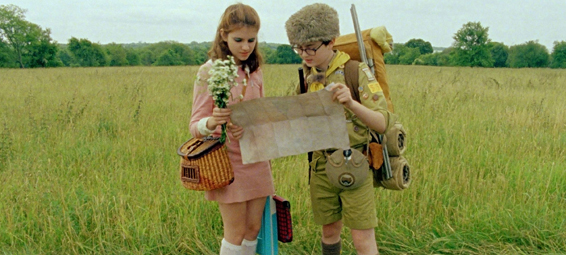Say what you’d like about Wes Anderson – that his dominant visual style has eclipsed the emotional profundity realized in his early works, that he has become a parody of himself – there are few filmmakers working today whose work is so instantly recognizable and immediately their own. Indeed, from the first few shots of Anderson’s latest film, Moonrise Kingdom, the perfect symmetry of the compositions, the gliding camera that pauses to frame a series of introductory vignettes, the color pallet dominated by a single, golden hue, all these elements quickly establish a world that is uniquely the director’s: that characteristic blend of hyperbole and absurdity, a world both emotionally overt and strainingly precocious.
Moonrise Kingdom is set on an island off a coastline that is not recognizable on the map, but whose topology identifies it as distinctly New England. The film was shot near Newport, R.I., but that the isolated island isn’t clearly a real place is important. As he has in the past, Anderson is working again with a world apart, a social ecology that is both removed – literally—from a more recognizable reality, and operating on its own terms. In his earliest films, Anderson dealt with characters – such as Bottle Rocket’s Dignan or Rushmore’s Max Fischer– whose own skewed expectations and desires set them apart from the rest of the world. Here the film’s entire world feels removed, which lends Moonrise Kingdom a fairy tale quality.
This sense of a reality slightly askew is established, in part, throughAnderson’s affinity for the pageantry of feigned affectations. They are most acutely present in the troupe of boy scouts who run a summer camp on the island. Led by Scout Master Ward (Edward Norton), the troupe is an idealized vision of organization and discipline, played to militaristic levels of intensity. Our plot is set in motion when one of the boys, Sam (Jared Gilman) goes missing, cutting himself out of the troupe by cutting a hidden hole in the side of the neatly-seamed pup tent. The hunt is on.
Sam’s disappearance must play into the other cluster of characters on the island: a family that lives in a large Victorian house with a bay view, set among picturesque coastal meadows. Walt (Bill Murray) and Laura Bishop (Frances McDormand) are both lawyers, and present a familiar Anderson-esque conceit: the detached upper middle class parents, whose heightened cultural sensibilities underscore an exaggerated emotional and personal aloofness. The first time we meet the Bishop children they are listening to an instructional record that walks through the parts of the orchestra, breaking down a score by Benjamin Britten. It’s a less than concealed metaphor: Moonrise Kingdom is a story about the parts of this social ecosystem coming unhinged, and finding their way back together again.
As we suspected, Sam reemerges from the wilderness to rendezvous with the Bishop’s muted and estranged daughter Suzy (Kara Hayward), and the two set off on an adventure in search of a little piece of paradise. As the island launches into a tizzy, the lone police officer, Captian Sharp (Bruce Willis), leading the scout master and his boys on a search for the missing children, Suzy and Sam seek out isolation in the wilderness, setting up camp in a remote lagoon. We soon learn, through a series of flashback montages, that the two outcasts fell in love the summer before during a children’s performance of a Britten opera at the island’s little church. Moonrise Kingdom borrows a little from Badlands and Blue Lagoon, as well as, presumably, the young adult adventure stories it liberally quotes throughout. Set apart from the adult rigor that defines the two youngster’s world – the cultured family, the discipline of the troupe – Suzy and Sam are free to discover their own free wielding imagination, hopes and dreams of the future, and a nascent sense of sexuality.
Anderson’s movie, co-written by Roman Coppola (CQ), is not as raucously funny and amusingly dry as some of his other films. The director delivers a flurry of absurdist antics as the hunt for the children intensifies as a severe storm bears down on the island. Bill Murray’s role, again a myopic, misanthropic and fatalistic father, is reduced to a sideline character, but he finds his moments. Jason Schwartzman is able to take a smallish part as a senior scout (Cousin Ben) and make it memorable. While Tilda Swinton’s straight-faced character “Social Services,” is a casting one-liner.
Instead of ramping up the absurdity of its setting, Moonrise Kingdom focuses more in its story about young love, and it takes care to pronounce its rounded notes of sweetness and establish its sense of innocent longing. And as much as it leans towards a cutesy sentimentality, I still found myself swept up in its story much in the same way as I have always enjoyed Rob Reiner’s Stand By Me. Moonrise Kingdom is not so much a film about adolescent love as it is a film about what it is to remember adolescence. Suzy and Sam’s romance is presented through the idealized lens of maturation, unfolding like a pup tent fantasy, or an adult scrambling his memories to imagine how wonderful life could be if we found ourselves young again, but full of precocious self-possession. It all makes Moonrise Kingdom feel more than a little infatuated, yet undeniably infectious.






